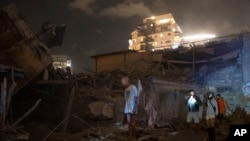Reporter Lai Sufen was in Tel Aviv on Saturday when Hamas launched attacks across southern Israel. She spoke to VOA's Mandarin Service about what she experienced.
At about 6:30 in the morning on October 7, we were awakened by a piercing air raid siren. This scene is common in Israel. I have lived here for many years and experienced many rocket attacks. I am already familiar with air defense sirens, hiding in air defense rooms, and the explosion sound of rockets intercepted by the Iron Dome system. However, this time the situation was different because it was the Sukkot holiday and the Sabbath. Waking up in the early morning and being forced to quickly hide in the air-raid shelter was something the Israelis who live here do not expect.
For more than 30 years ago, Israeli residential building regulations have required every home to have an air defense safe room. For older apartments, the entire building shares an air raid room on the first floor or underground. It became a rare opportunity to interact with neighbors when air raid sirens sounded. Sunday morning, after we entered the air raid room three times in a row, we realized from the TV news reports that Israel was facing a horrific crisis.
Television news reports showed chaotic scenes as armed Hamas militants infiltrated into Israeli territory and clashed with Israeli security personnel as residents in the south desperately called for help. Since then, television news has continued to report live on the latest developments in the situation and casualties, further shocking and angering the Israelis.
In the evening, we heard several more air raid sirens. Reporters and neighbors gathered in the air raid room. This time, compared to the half-asleep confusion in the morning, everyone became depressed and sad. In the past, when entering the air raid room, the neighbor's children always laughed happily, but this time, they were particularly quiet. The mood was filled with anger.
On the second day after the conflict broke out, air raid sirens no longer sounded in Tel Aviv and it was relatively quiet and most shops, restaurants and cafes were closed. The streets are also sparsely populated, students are not going to school, and most people are not going to work.
This reporter rode a bike along the bicycle path of Yarkon Park to the usually bustling Tel Aviv Port business district (Tel Aviv Port). However, there was almost no one along the way.
The people who usually roamed, played sports and had picnics in the park disappeared, and I only encountered a few Chinese migrant workers fishing by the river. Most of them are employees of China Railway Tunnel Bureau Group Co., Ltd. One of them told reporters that because of the tense situation, they did not need to go to work today. He also mentioned that a colleague working at a construction site in southern Israel was shot and wounded during the Israeli-Hamas conflict and is now in the hospital.
I also met two tourists from Italy in the park. They said they were at the airport preparing to board their flight, but the flight got canceled at the last minute and they had to wait a few more days. They said the quietness on the streets reminded them of the first day after the COVID-19 lockdown.





